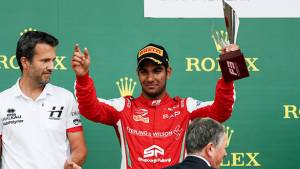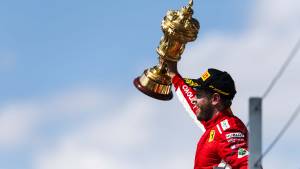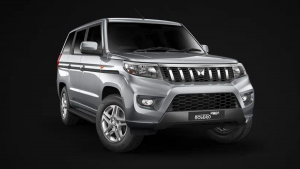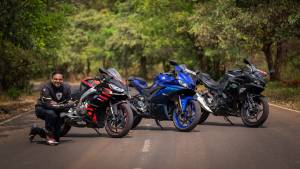Interview with Prakash Shukla, Mufaddal Choonia and Viren Popli from Mahindra Racing
We recently met Viren Popli, vice president of Mahindra Two Wheelers, Prakash Shukla and Mufaddal Choonia, chairman and team principal of Mahindra Racing respectively. Here is what the trio had to say about Mahindra's progress in Moto3, racing in general and race-tech trickling down to their road legal motorcycles.
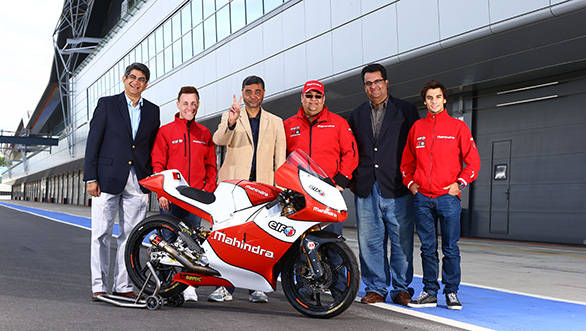 L-R: Viren Popli with Effren Vasquez, Prakash Shukla, Mufaddal Choonia, Darius Lam and Miguel Olivera
L-R: Viren Popli with Effren Vasquez, Prakash Shukla, Mufaddal Choonia, Darius Lam and Miguel Olivera
OD: How does racing tie in with the group?
PS: Mahindra has mobility and non-mobility businesses, is in both manufacturing and services and it conducts these operations both in India and abroad. In this, the association with mobility is very strong and it is a big part of our business. Racing therefore, has natural tie ins at the brand level, at the mobility level as well as directly in terms of technology transfer with our two-wheeler business.
Many companies have enjoyed a more youthful image by associating with racing through sponsorship. We are associated with racing but not through sponsorship. We are participants. That is a big difference.
Today, Mahindra Racing has 1 million fans on Facebook. Which is very interesting despite the fact that Moto3 has not come to India. That makes us the fifth largest sports team in the country and all four ahead of us are cricket teams that conduct their business in India.
VP: We are in the midst of expanding our presence in the two-wheeler busines all over the world. Last month, we opened up in Nicaragua, Guatemala, Bangladesh and Sri Lanka. And we are expanding into other parts of the world as well. Clearly MotoGP and its presence gives us a huge acceptance levels into these markets. At the very least the biking enthusiasts see us. This is a direct benefit.
Second, Europe itself is the home of biking and if we start doing well, if our products and our brand name gets well known here, then there is an opportunity for us to see what we can do with our brand and our capability that we are developing so wonderfully here.
How do we take this [brand and capability] into an enthusiast level product? Because this market can not only absorb but also pay for some of the cutting edge tech that is getting developed here. Eventually if we have the base then we can take it to other parts of the world.
OD: How has the journey been so far?
PS: We are a toddler in racing, competing against people who are, to keep the same analogy, in their 20s and 30s. As a toddler we have given them a good fight. The credit must go to the entire team. The team came together from different nationalities - Spanish, Portuguese, Italian, Swiss etc. Together we achieved what we have achieved.
This year, we have already 5 fourth positions and the difference is one-tenth or one-twentieth of a second. In fact, our bike and our riders have the best performance in the top three. It is only because we have only two riders and others have more that it looks like we are third. We have the most consistent performance among the three manufacturers in Moto3.
VP: Racing is the fastest way to gain experience be it in terms of technology, of process or of brand. As we move into higher performance bikes this will start coming to its own. Our learnings here will enable us to do this better back home in India.
Back home in India we are, like in racing here, a toddler in the two-wheeler business there. We are just about starting to make some moves into the market which I think are positive. We believe the racing connect will allow us to earn our stripes to talk to the enthusiasts there.
OD: Are you going to go racing in India as well?
VP: We are looking very keenly at the whole racing environment in India. We are watching what is happening there, how it is happening and how do we make it bigger, better as well as safer. How to make it more accessible to everyone. Look at the environment here. You see young kids, parents, wives, girlfriends all hanging out. It is a fun day out for the family. Which is just not what it is back home. How do we transform racing into a fun sport that everyone can enjoy together is the challenge for racing back home.
OD: Tell us about the development process for the bike.
PS: It is a never ending process. Every time the rules are tweaked, you need to make the bike again. The competition is not sitting idle either. One of our major competitors who has been in the business for decades is nowhere near us this year and people are asking what happened to them. I am sure they are working hard. So we will continue to have challenges from the field and we have to stay one step ahead of them.
I don't think they will have a new bike for 2014 and their new bike should come in 2015. So next year is a wonderful opportunity for us to get our bike and riders to the next stage. I can see the end of the 2013 and 2014 as a wonderful time when our performance will be peaking while the competition will continue to be what it is today. We have a golden opportunity ahead for us.
OD: Mahindra is also supplying bikes to other teams...
PS: The ultimate proof is that your product is such that others a giving up bikes that they have been patronising for decades and moving to your bikes. [Originally, Shukla said other teams would start next year but after the interview, Ambrogio Racing was announced as switching to Mahindra at the very next round in Misano]. They are also buying our bikes at higher prices than others. Our ranking of third in the manufacturers' championship is because we have only two riders. We are technically today, number one.
I think going forward, as more teams buy it, then more and more others will see racing inspired products. Racing bikes, obviously, cannot be sold to the general public. But racing inspired products will appeal more in the higher horsepower segments.
OD: How does racing directly affect your two-wheelers?
VP: Today, everything is done on computers. You don't build validation prototypes until a lot of simulation work has gone in. A lot of that software and technology is being done here as well as back in India. That trains the people back home as well. The level of detail work we do enhances skills of the people back home who can then use these skills for other projects.
We are learning lots and the first level is software and analysis. The second level is to actually put people into this team. The team is largely European and you can't just put in a person. This environment is very specific and role oriented and everyone must carry their own load or they become a hindrance. It is too early to mess with this right now. The best thing right now is to outsource some of the work and start building the skill sets.
Similarly, we are also working closely with Suter Racing. And they will also work on the products that we do. This expands the ecosystem for us. The racing ecosystem is now available to us and those are all options we are looking at and exploring.
Then there is the area of serviceability. We want to see how we can use some of the quick release stuff the racing team uses for our products without compromising the price or quality of our stuff. The biggest challenge of translating race technology to production, obviously, is cost. These bikes cost thousands of Euros each and the life of the engine is only 1500km.
MC: In three years of racing, we have gained a lot of experience. And we have sourced from within already. Three Mahindra engineers were placed in Suter, at the factory, for three months during the developing of this bike. A lot of simulation and analysis work has been done. This is how we shortened the product development cycle for this bike. Otherwise it would have been impossible. The project was fast tracked by having resources from India and outsourcing to India. Now we are seeing how the amazing facilities at the Pune Two-Wheeler R&D can be used to further improve the product.
OD: Do your riders participate in product development?
VP: We are hoping but certainly in the season they don't have a day to spare.
MC: There is a plan to share the riders for sure. We would be stupid to have such a resource and to not use it. But the product pipeline we have for the market right now does not require this kind of development. But what is to come over the next year - year and a half will certainly need this.
VP: We are also looking at booking tracks here in the future for development and testing over the next year.
MC: It isn't just the riders. There is a lot of value that the racing team will be able to add to the M2W portfolio. This is happening in a small limited way and will only increase. When we started, within the group we didn't know much about racing. So we depended upon Engines Engineering for the knowledge. Then they decided to move away from the group. This made things very difficult, especially the transition. Last year's performance was not the best.
But there were a couple of things that really egged us on. Within the [Mahindra] group, we have never really shied away from failing, or let me use a better word, learning. We had always said if there is something new, if you are a pioneer, if you are first, then there will be some learning. So we knew that this was going to be difficult. We were entering, straight away, the Olympics of motorsport.
We could have rebranded or sponsored a team but we would not have learnt anything. So we decided to build our own bike. They all thought we were crazy. But we thought that without crazy there could be no magic.
VP: It was a big risk. If you looked at the competition in size and scale there were a thousand reasons to not do this and only one to pursue it.
MC: We did have a challenge recruiting against the established factories. Everyone thought that here is an Indian company with someone who likes to be seen at race tracks with a glass of champagne. They questioned our seriousness as a team. But we have always been honest.
Even when we recruited Miguel and Efren last year, they had lots of questions too. And we told them to join us if they believed in us. Believed in the project and our goals. Join us if you feel you can made a difference and that you can win. There will struggles and things that we do not have like the established factories. But let us do this together. There is fun in the destination, but also in the journey.
So many people here in the paddock now want to be in Mahindra Racing because they feel they can contribute to a new team. That they can take credit, where in an established team the credit doesn't go to that guy. I think there is a lot of respect in the paddock for Mahindra Racing today.
